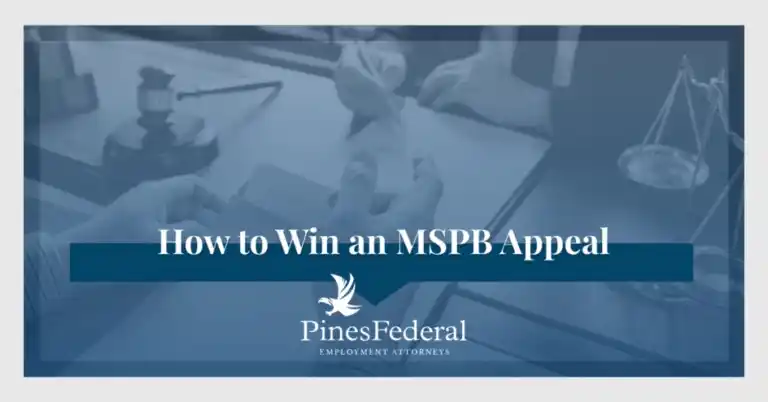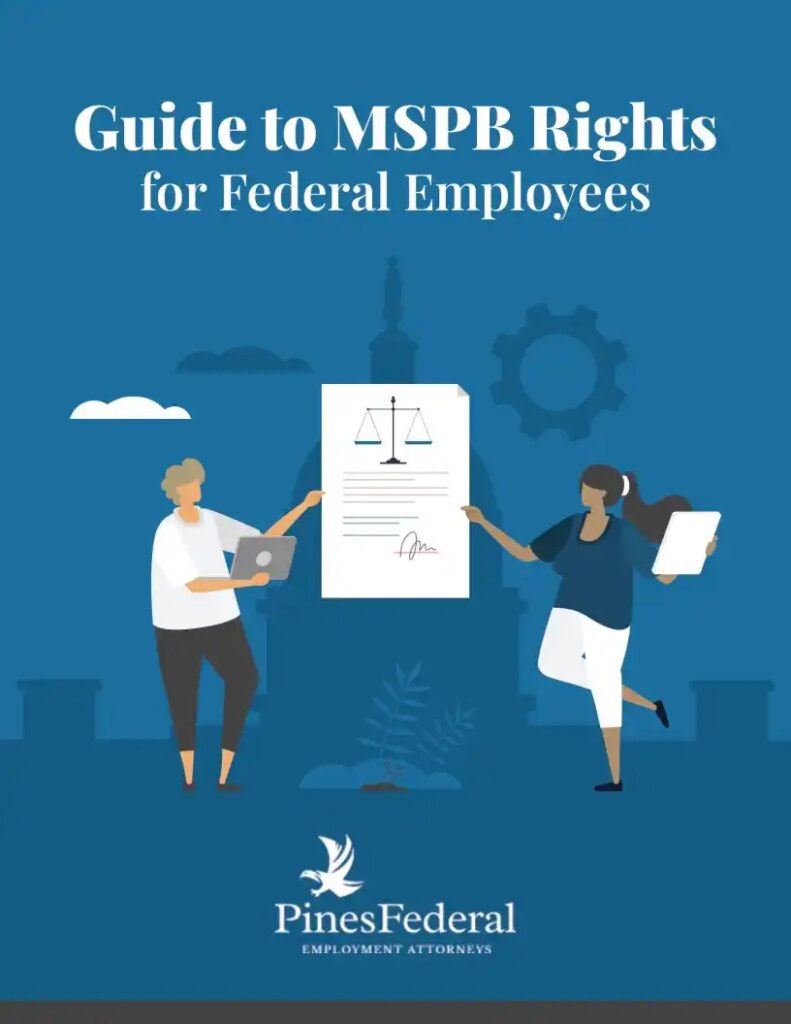
Unlike private sector employees, virtually all federal employees have the right to appeal adverse actions taken against them.
If you want to appeal an adverse action – such as a removal/termination, demotion, suspension longer than 14 days, or denial of Within-Grade Increases (WIGI) – then you may need to file a Merit Systems Protection Board appeal (MSPB) to challenge the action.
The MSPB is a unique government agency that not only hears and decides your case, it can also reverse your agency’s action and grant you various forms of relief, including job reinstatement, back pay, removal of the offending action from your personnel file (i.e., cleaning your record), reimbursement of attorney’s fees, and, in many cases, especially where an EEO, Whistleblower, or other type of claims are involved, compensatory damages and/or consequential damages.
Read on to learn more about the basics of MSPB appeals and how you can file one today. We will also discuss how to win an MSPB appeal. If you are considering filing an MSPB appeal or facing discipline, you should contact a qualified MSPB attorney immediately.
The deadline for filing an appeal with the MSPB is generally 30 calendar days from the date of the action; however, certain grievable offenses may need to be filed sooner, and cases with VA employees, for example, may be subject to a 10 business-day deadline for filing.
Give us a call at (800) 801-0598 or send an online message today.
First Things First: Who Can File Merit Systems Protection Board Appeals?
The MSPB is an independent federal agency designed to “promote an effective Federal workforce” free from discrimination, nepotism, and various kinds of corruption. The MSPB executes this goal by hearing appeals brought by federal employees who have had an adverse action taken against them.
Appeals include the following actions against federal employees:
- Removals,
- Suspensions of more than 14 days,
- Demotions,
- Furloughs of less than 30 days,
- Performance-based removals, and
- Denials of within-grade salary increases.
Probationary federal employees can bring MSPB appeals as well, but only for limited reasons. Most hearings are heard by an administrative judge (AJ). However, certain cases and appeals may be brought before the Board itself, which features three judicial officers.
[DOWNLOAD] MSPB Rights for Federal Employees

When and How Do I File an MSPB Appeal?
You have only a limited time to file an MSPB appeal. Specifically, you need to file an appeal within 30 calendar days of the effective date of the adverse action that you are appealing or within 30 calendar days after the date of the receipt of the agency’s decision (whatever is later). If the 30th day falls on a weekend or federal holiday, the filing day will be extended to the next business day.
The appeal timeline can be extended to 60 days after the adverse action if you and the agency attempt an alternative dispute resolution process before involving the MSPB. If you both agree to this in writing before the initial 30 days are up, you could receive a 30-day extension to the traditional filing deadline.
However, if you miss the deadline for filing your appeal, it will probably be dismissed by the MSPB.
You may file an appeal in writing and online. To file in writing, print and complete the MSPB’s appeal form. You can then submit the completed petition for review to the Clerk of the Board by fax or postal mail. You can also submit a petition for review in person at a local or regional MSPB field office.
You can file online as well using MSPB’s e-Appeal website. Be aware that the MSPB does not accept new appeals via email. If you want to file your appeal digitally, you must use the e-Appeal online form.

“I have never been involved in a court case before and was scared to make even the first phone call to seek legal counsel. I found Pines Federal after reviewing several offices…My case was settled to my satisfaction and I can’t recommend this practice enough…”
What Happens When I File My MSPB Appeal?

Filing the initial appeal form is just the beginning of the MSPB appeals process. Let’s walk through the other steps traditionally involved in the Board’s full review and decision-making process.
Acknowledgment Order
After you file your appeal request, the administrative judge will send you and your agency an Acknowledgement Order confirming the details of your claim. The AJ will instruct the agency to respond with a statement explaining its reasons for taking the adverse personnel action you’re challenging. The agency must also submit all the evidence it has to support its decision and the case against you.
Pre-Hearing Scheduling
Once the agency has submitted its evidence, the AJ will generally issue a Scheduling Order. This order establishes a timeline for the rest of the appeal, including when you can begin discovery and submit pre-hearing evidence. It will also set a date and location for a pre-hearing conference with the AJ and your agency.
Note: Sometimes, the Acknowledgment Order may include these important scheduling details.
The AJ will also generally hold a preliminary conference with the parties before the official hearing. During the status conference, the parties and the AJ discuss the key issues of the appeal and potential settlement options.
Discovery Process
After this preliminary conference, the parties are given time to complete discovery. During the discovery process, each party asks the other for important information or factual admissions before the hearing. These can include documents, recordings, electronic data, and other information relevant to the case. The discovery process may also include depositions, where one party interviews another to collect sworn testimony regarding certain facts.
Once discovery ends, the parties hold a pre-hearing conference with the judge. At this conference, the AJ discusses several key matters with the parties, including general hearing procedures, each party’s witnesses and exhibits, and any stipulated facts.
Hearing Stage
An MSPB appeal hearing is an administrative process, although it appears similar in structure to a state or federal court trial. In the hearing, each party presents its case and supporting evidence. You may call witnesses to testify in your favor, and the agency can cross-examine them.
After the hearing, the AJ will generally announce a decision within 30-90 days.
Petition for Review
If you’re dissatisfied with the initial decision in your case, you may be able to file a petition for review. Whether you can appeal the AJ’s decision and how you do so depends on the specific circumstances of your case. Generally, you have only 35 days to file your petition to have the judge’s decision reviewed.
Remember that you must meet a high legal standard to overturn an administrative judge’s MSPB ruling. This is generally only possible if you can show that serious procedural errors happened during the hearing—and that if it weren’t for these errors, the judge would have made a different decision.
In some situations, you can file a lawsuit in U.S. District Court or the Federal Circuit Court after an unsuccessful appeal. A federal employment lawyer can help determine if this is an option in your case.
Featured Case Result
WHAT HAPPENED: A client went through an extremely complex and difficult constructive and involuntary removal action on an appeal at the Federal Circuit Court of Appeals. Our firm’s appeal at the Federal Circuit Court of Appeals revealed that this was an issue of first impression before the board.
5 Ways to Increase Your Chances of Winning Your MSPB Hearing
Certain actions taken before and during the MSPB hearing process can make all the difference between a successful appeal and the end of your federal career.
The following actions, in particular, can maximize your odds of winning your case.
Learn the Agency’s Motives
When a federal employer takes disciplinary action against you, you have the legal right to review the information that informed their decision. Knowing their reasons for taking action is essential for building a strong counterargument on appeal.
File Promptly
Your initial appeal only needs to cover the basic facts of your case. You’ll have opportunities to submit additional evidence and information later.
Agency lawyers will look for any reason to have the AJ dismiss your appeal on technical grounds. Don’t give them the opportunity by filing your appeal late.
Make Discovery Requests
The discovery phase of your appeal is a key opportunity to get as much information as possible from the other party. Don’t assume you know all the facts there are to know in your case. File a production request for all relevant information available from your employer.
Submit All Relevant Evidence
Failure to provide sufficient evidence is one of the most common reasons federal employees lose their MSPB appeals. As soon as you learn about a potential adverse action, collect any relevant communications, emails, data, etc. When it comes time for your hearing, include all relevant documentation in your pre-hearing evidence submission. It’s always better to have more documentary proof to support your claim, even if you don’t use all of it.
Call a Skilled MSPB Lawyer
A qualified MSPB lawyer can make or break your appeal. An attorney with a track record of representing federal employees can help you understand your rights, establish your odds of success, and apply the law to the specific facts in your case. They can also help you organize your evidence into a clear narrative that presents your side of the story in a compelling way.
Our Team Has the Answers on How to Win an MSPB Appeal
Obtaining the right lawyer is the most important action you can take to save your federal career and win your appeal. Yet, not all attorneys are equal. The best attorney is one with a track record of success and plenty of experience representing federal employees at MSPB hearings.
Our Pines Federal team has a lot of experience with MSPB appeals. Our attorneys have served clients across the nation for more than 20 years. During that time, we have obtained incredible results for our clients and have held many discriminatory agencies accountable. Call us today at (800) 801-0598 or contact us online to get started.